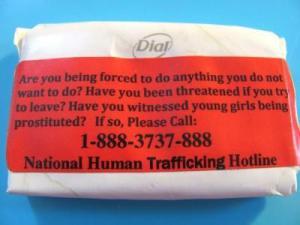Last week I published a letter from an exceptional woman: though she’s a Christian with a strong personal aversion to sex work, she has deeply considered the issues and realized that there are many, many problems in “anti-trafficking” discourse. After my last letter she wrote again with more good questions, but her letter was so complex that I have separated out the individual questions not only to make this column easier to read, but to protect her privacy by eliminating personal details. If you haven’t yet read last Wednesday’s column, you really ought to do so before proceeding with today’s.
A friend of mine belongs to an anti-trafficking ministry which gives out gift bags to ladies in brothels and tries to build friendships with them. The gift bag includes shampoo and sometimes cookies and earrings, and also a packet of tissues, inside which they have slipped a hotline for getting out of prostitution. Would you personally find such a message with a hotline number insulting?
 Most sex workers would probably consider that more funny than insulting, because the idea outsiders have that we’re all “trapped” or “victims” or “slaves” is very amusing when it isn’t backed up by uniformed thugs. But once the cops start smashing down doors, beating, raping and robbing sex workers before caging them and giving them criminal records that will follow them for life, it goes far beyond mere insult. The idea that we’re “victims” is a symptom of what you mentioned in your first letter: the refusal to listen. It’s kind of like the way gay people are treated in some churches: “I can’t understand how a man could be attracted to another man, so there must be something wrong with them.” The old narrative was that sex workers were “bad” women, but over the past 800 years Christianity has slowly shifted toward viewing us as “fallen” creatures to be redeemed, and that became the dominant social discourse in English-speaking countries from the 1880s on (largely due to the influence of the Salvation Army and other groups promoting the “white slavery” hysteria). After criminalization became the norm in the US (from 1910-1914), people naturally started seeing prostitutes as “criminals”, and that view persisted until the beginning of the present moral panic in 2004 (though several years earlier in Sweden).
Most sex workers would probably consider that more funny than insulting, because the idea outsiders have that we’re all “trapped” or “victims” or “slaves” is very amusing when it isn’t backed up by uniformed thugs. But once the cops start smashing down doors, beating, raping and robbing sex workers before caging them and giving them criminal records that will follow them for life, it goes far beyond mere insult. The idea that we’re “victims” is a symptom of what you mentioned in your first letter: the refusal to listen. It’s kind of like the way gay people are treated in some churches: “I can’t understand how a man could be attracted to another man, so there must be something wrong with them.” The old narrative was that sex workers were “bad” women, but over the past 800 years Christianity has slowly shifted toward viewing us as “fallen” creatures to be redeemed, and that became the dominant social discourse in English-speaking countries from the 1880s on (largely due to the influence of the Salvation Army and other groups promoting the “white slavery” hysteria). After criminalization became the norm in the US (from 1910-1914), people naturally started seeing prostitutes as “criminals”, and that view persisted until the beginning of the present moral panic in 2004 (though several years earlier in Sweden).
I have seen sites that quoted (at least they claim) comments from clients about prostitutes, 95% of which were horrendous. So why do clients come to you? Is it really that men who are willing to buy women are often aggressive and do not respect women in general?
Those “client quotes” are totally cherry-picked. The idea that men pay good money to spend time with women they hate is about as absurd as anything I can think of; it’s related to the radical feminist notion that all intercourse is rape. The fact is, I was often treated better by the men who paid me than guys who just dated me, and that’s a very typical experience. The majority of sex workers’ clients are either horny or lonely, and that’s it. They’re not looking for women to “objectify” or “abuse”, and the only people who can believe otherwise without being lied to are people who believe the Marxist foolishness that all economic transactions are innately exploitative, or those who believe that all sex not sanctified by marriage (or all heterosexual sex, period) is bad. The only reason they pick on sex work is that when they try to apply those ideas more universally, most normal people mock, shun or ignore them. Sex workers have been turned into a pariah caste against whom rhetoric that wouldn’t last five minutes when directed against anyone else, suddenly becomes palatable. The most common form of prostitution these days is probably GFE escorting, where GFE stands for “girl friend experience”. In other words, the majority of clients want a girl who is nice and friendly and chatty and sweet, just like a regular date. Yes, there are bad clients…but that’s true of every business in the world, as anyone with experience in retail or waitressing can tell you.
Do you not mind when a man comes to you only for your body, with no interest in your personality, your soul, your mind, your history? Although if I must think of sex work as normal work, I suppose it would be as ridiculous as if I asked an office worker, do you not mind that your boss has no interest in your personality etc and that you are reduced as just a working cog in a cooperation. In an office, ideally you’d find a caring manager who does care about your well-being – and I guess there are clients who are similar?
 As I explained above, most clients are. If you talk to sex workers who have had “straight” jobs, you’ll find they usually felt far more objectified in those than in sex work. People who talk about “bodies to be used” must have a very low opinion of men, to believe that that’s how men see sex. In fact, one of the most annoying client behaviors is when they go on about “I want to give you pleasure” and “what would you like to do?” and that sort of thing, which many of them do. We hate it because it makes it much harder to satisfy a customer who won’t say what he wants, but as you can see it’s exactly the opposite of that “objectification” jazz. When I was an escort I advertised myself as “the thinking man’s companion” because I have a hard time “dumbing down” my conversation and wanted to attract men who liked that…and there were plenty. You were talking about reviews earlier; you know who gets the worst reviews? Girls who just lie there like a “body to be used”. What prohibitionists claim men are looking for, is actually the thing which will probably kill a sex worker’s business faster than anything else.
As I explained above, most clients are. If you talk to sex workers who have had “straight” jobs, you’ll find they usually felt far more objectified in those than in sex work. People who talk about “bodies to be used” must have a very low opinion of men, to believe that that’s how men see sex. In fact, one of the most annoying client behaviors is when they go on about “I want to give you pleasure” and “what would you like to do?” and that sort of thing, which many of them do. We hate it because it makes it much harder to satisfy a customer who won’t say what he wants, but as you can see it’s exactly the opposite of that “objectification” jazz. When I was an escort I advertised myself as “the thinking man’s companion” because I have a hard time “dumbing down” my conversation and wanted to attract men who liked that…and there were plenty. You were talking about reviews earlier; you know who gets the worst reviews? Girls who just lie there like a “body to be used”. What prohibitionists claim men are looking for, is actually the thing which will probably kill a sex worker’s business faster than anything else.
My anti-trafficking friend never says “prostitute”, but rather “ladies in the sex industry”; she also never gives out their names “in order to protect their confidentiality”. But if sex work is just work, what difference does the word make? And why wouldn’t prostitutes want people to know their names?
If sex work were completely accepted, normal and legally protected, I would agree with you that there would be no need for aliases. But that isn’t the way it is, and it won’t be in our lifetimes. Your friend is wise to be discreet. As for the term “prostitute”, it’s a very legalistic word that has acquired considerable negative baggage. So while I myself use it because many outsiders with whom I discuss it (especially lawyers & politicians) see it as a neutral term, it is in fact pejorative and should be avoided. “Sex worker” is considered the most polite term; “prostituted woman” is the most insulting and demeaning because it casts us as passive, inert victims without intellect, will or agency.
I’m uncomfortable saying that sex work should be okay and treated as any other job, but I’m also uncomfortable with criminalization because everyone has the right to choose what they will do and how they want to live their lives. How do I resolve this conflict?
Now we’re getting into the philosophy of harm reduction, which is quite complicated but here’s the nutshell version. I personally think cocaine is awful; I hate the way people act when they use it, I hate the way it makes their noses run and their mouths get crusty, I hate the weird fantasies they have when they’re on it. Eventually I got to the point where I’d refuse clients I knew were using it because I didn’t want to deal with it. However, the harms that result from cocaine aren’t nearly as bad as those that result from attempting to suppress it, such as the establishment of a surveillance state, empowerment of police to violate civil rights on a massive scale, bloody cartel wars, bad (even fatal) reactions to tainted drugs, the attraction of criminals to the business, the vast waste of money and the highest incarceration rates in history. I don’t have to like cocaine or approve of its use to recognize that its prohibition is a horrible thing and the wellspring of myriad evils, and you don’t have to like or approve of sex work to have the same view about its prohibition. And considering that it is the prohibition of sex work that is the chief enabler of coercion, I would think that every moral person who is truly concerned about that would join with the UN, the Global Alliance Against Traffic in Women, Human Rights Watch, Amnesty International and many others in calling for the decriminalization of sex work.
